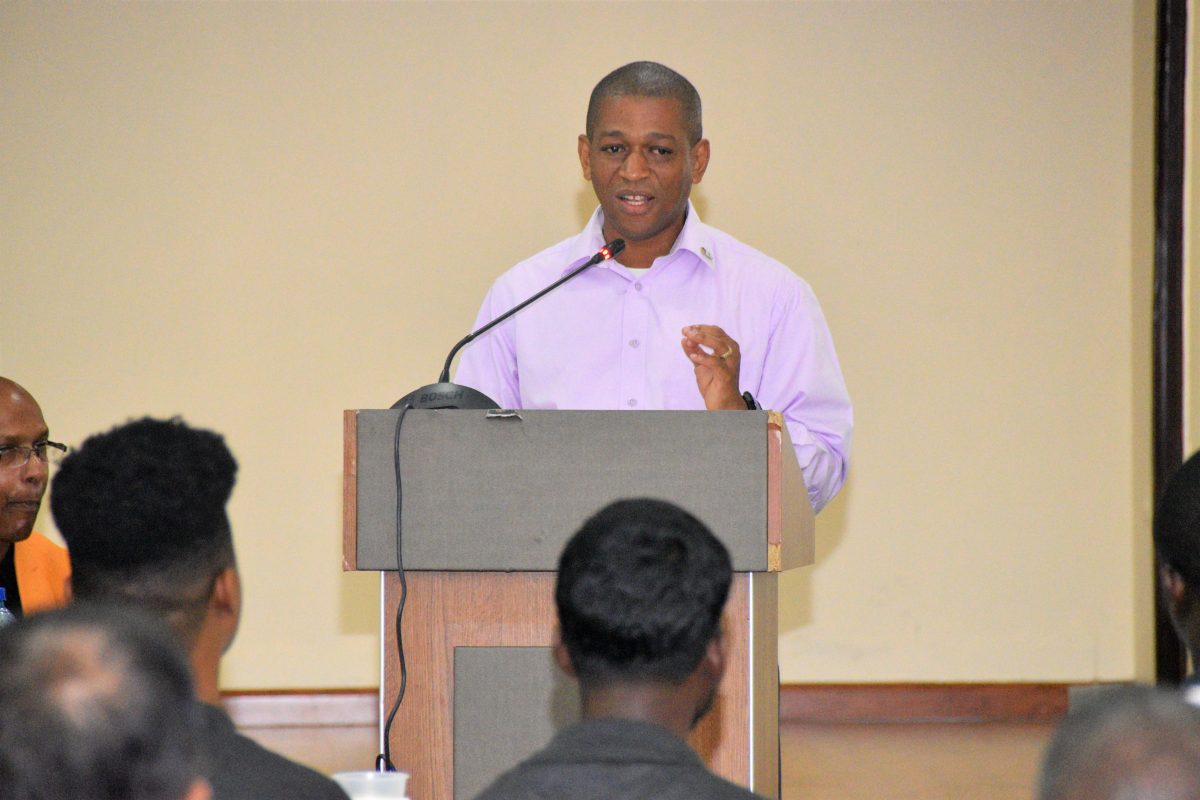The Department of Energy (DoE) will sign a contract later this month with the firm which successfully bid to help overhaul the legislative framework to regulate Guyana’s burgeoning oil and gas industry, Director Dr Mark Bynoe has said.
Bynoe was unable to share the name of the firm as the contract has not yet been signed, when contacted by this newspaper last Thursday. He said, however, that a gap analysis had been conducted to ascertain specific areas which are lacking, and therefore in need of attention.
Stabroek News had contacted Bynoe regarding the recent mud-spill which occurred offshore in the Kanuku Block, and for an update on the DoE’s efforts to improve and/or promulgate new laws to regulate Guyana’s petroleum sector.
The question of sufficient and effective regulation looms large on its own, but assumes additional significance in light of the mud-spill, which Spanish oil company, Repsol, the operator in the Block, is being held responsible for, along with the company contracted to carry out drilling operations, United Kingdom-headquartered Volaris Drilling.
The Environmental Pro-tection Agency (EPA) is the regulatory body tasked with addressing such environmental incidents, and for this reason, Bynoe said he preferred that the EPA address questions pertaining to the spill, and any penalty which results.
EPA Executive Director Dr Vincent Adams told Stabroek News that letters informing Repsol and Volaris Drilling that they will each be fined approximately $1 million (approximately US$5,000) have been finalised, and are waiting to be dispatched, pending reviews.
From the policy standpoint, which the DoE is charged with, Bynoe said “we are going to be, this month, signing a contract with the company that will be doing the legislative overhaul for Guyana.”
Last April, government invited applications for a consultant to provide advisory services on legal matters in the oil and gas industry. According to the Terms of Reference, published on the Ministry of the Presidency website, the objective of the assignment is for the consultant to provide advisory services and technical support on legal and regulatory frameworks for the oil and gas sector to the Government of Guyana, through the DoE.
It said the consultant would be required to support the Attorney General’s Chambers in reviewing, assessing, and, if necessary, re-drafting necessary legislation to ensure that draft legislation is in good order for presentation to the National Assembly for passage into law.
The consultant would also be required to advise on, and provide a framework detailing legislation, and regulations required for the development of a comprehensive downstream petroleum sector, and support the drafting of such legislation and regulations, initially focusing on the use of associated gas.
The terms of reference enables the development of local content in the area of regulatory frameworks surrounding the oil and gas sector, as the contractor is required to provide constructs for the transfer of knowledge, including mentoring arrangements to Guyanese lawyers within the DoE, the Attorney General’s Chambers, and other ministries or agencies as identified by the DoE, on legal aspects of the petroleum industry.
‘These things take a while’
Government has known that oil production in Guyana was imminent as far back as 2015, and recommendations for improvements to our laws are as old.
The 2017 Guyana Extractive Industries Transparency Initiative (GYEITI) report, which was published last year, recommended the acceleration of reform of Guyana’s petroleum legislation.
Specifically, the report noted that to “promote a favourable legal environment for investment, and to boost the confidence of private operators, the Multi-Stakeholder Group (MSG), which manages GYEITI, should follow up with the DoE to accelerate the reform of the petroleum legislation, and to determine how technical barriers delaying the process could be addressed.”
Asked whether the signing of this contract for this initiative at this stage, after production had begun, and after a buyer for Guyana’s share of first-oil has been selected, is unjustifiably tardy, Bynoe said, “I would not say so, you know. These things take a while to process.” He added, “We need to be mindful that the Department is young. This stage is a huge achievement given that we are just about a year old.”
Bynoe also said the process to arrive at this stage takes time and explained that the government of Guyana has been receiving support regarding upstream oil operations as far back as 2013. He also shared that there is a need to acquire resources to address some of these matters, and added that there are usually procurement processes which also take time.
The petroleum sector in Guyana is governed largely by the antiquated Petroleum (Exploration and Production) Act, promulgated since 1986. Further, while the EPA is charged with regulating the environmental aspects of the sector, the Environmental Protection Act was promulgated in 1996, and its provisions, while allowing for significant oversight of the sector, are incapable of fully allowing the EPA to effectively dispatch its mandate.
Bynoe said that in the impending process, government will be “looking for areas to tighten, to repeal and or replace existing laws, and to compile new regulations as [the oil sector] is a new sector.”





